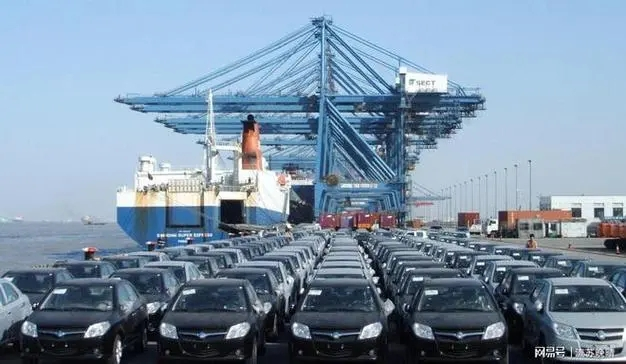Recently, multiple new foreign trade regulations have been implemented both domestically and internationally. China has adjusted its import and export declaration requirements, and multiple countries such as the European Union, the United States, Australia, and Bangladesh have issued trade bans or adjusted trade restrictions. Relevant enterprises must pay timely attention to policy trends, effectively avoid risks, and reduce economic losses.

1.Starting from April 10th, there are new requirements for the declaration of import and export goods in China
2.Starting from April 15th, the Measures for the Administration of Filing of Aquatic Product Raw Material Farms for Export will come into effect
3. Revised US Semiconductor Export Control Order to China
4. The French parliament has passed a proposal to combat "fast fashion"
5. Starting from 2030, the European Union will partially ban plastic packaging
6. The EU requires registration of imported electric vehicles from China
7. South Korea increases its crackdown on illegal activities on cross-border e-commerce platforms
Australia will cancel import tariffs on nearly 500 goods
9. Argentina fully liberalizes the import of some food and basic daily necessities
10. The Bank of Bangladesh allows import and export transactions through counter trade
11. Export products from Iraq must obtain local quality certification
12. Panama increases the daily number of ships passing through the canal
13. Sri Lanka approves the new Import and Export Control (Standardization and Quality Control) Regulations
14. Zimbabwe reduces fines for uninspected imported goods
15. Uzbekistan imposes value-added tax on 76 imported drugs and medical supplies
16. Bahrain introduces strict rules for small vessels
17. India signs free trade agreements with four European countries
18. Uzbekistan will fully implement the electronic waybill system
1.Starting from April 10th, there are new requirements for the declaration of import and export goods in China
On March 14th, the General Administration of Customs issued Announcement No. 30 of 2024, in order to further standardize the declaration behavior of import and export goods consignees and shippers, streamline relevant declaration columns, and decide to adjust the relevant columns and some declaration items and their filling requirements of the "Customs Declaration Form for Import (Export) Goods of the People's Republic of China" and the "Customs Record List for Import (Export) Goods of the People's Republic of China".
The adjustment content involves the requirements for filling in "gross weight (kg)" and "net weight (kg)"; Delete the three declaration items of "inspection and quarantine acceptance authority", "port inspection and quarantine authority", and "certificate receiving authority"; Adjustment of the declared project names for "destination inspection and quarantine authority" and "inspection and quarantine name".
The announcement will come into effect on April 10, 2024.
For adjustment details, please refer to:
http://www.customs.gov.cn/customs/302249/302266/302267/5758885/index.html
2.Starting from April 15th, the Measures for the Administration of Filing of Aquatic Product Raw Material Farms for Export will come into effect
In order to strengthen the management of exported aquatic product raw materials, ensure the safety and hygiene of exported aquatic products, and standardize the filing management of exported aquatic product raw material breeding farms, the General Administration of Customs has formulated the "Measures for the Filing Management of Exported Aquatic Product Raw Material Breeding Farms", which will be implemented from April 15, 2024.
3. Revised US Semiconductor Export Control Order to China
According to the Federal Register of the United States, the Bureau of Industry and Safety (BIS), a subsidiary of the Department of Commerce, issued regulations on March 29th local time to implement additional export controls, which are scheduled to take effect on April 4th. This 166 page regulation targets the export of semiconductor projects and aims to make it more difficult for China to access American artificial intelligence chips and chip manufacturing tools. For example, the new regulations also apply to restrictions on exporting chips to China, which also apply to laptops containing these chips.
4. The French parliament has passed a proposal to combat "fast fashion"
On March 14th, the French parliament passed a proposal aimed at cracking down on low-cost ultrafast fashion to reduce its appeal to consumers, with Chinese fast fashion brand Shein being the first to bear the brunt. According to Agence France Presse, the main measures of this bill include banning advertising on the cheapest textiles, imposing environmental taxes on low-cost goods, and imposing fines on brands that cause environmental consequences.
5. Starting from 2030, the European Union will partially ban plastic packaging
According to the German newspaper Der Spiegel on March 5th, representatives from the European Parliament and member states reached an agreement on a law. According to the law, plastic packaging is no longer allowed for a small portion of salt and sugar, as well as fruits and vegetables. By 2040, the final packaging thrown into the trash bin should be reduced by at least 15%. Starting from 2030, in addition to the catering industry, airports are also prohibited from using plastic film for luggage, supermarkets are prohibited from using lightweight plastic bags, and only packaging made of paper and other materials is allowed.
6. The EU requires registration of imported electric vehicles from China
The document released by the European Commission on March 5th shows that EU customs will conduct a 9-month import registration for Chinese electric vehicles starting from March 6th. The main objects involved in this registration are new battery electric vehicles with 9 seats or less and only driven by one or more motors from China. Motorcycle products are not within the scope of investigation. The notice stated that the EU has "sufficient" evidence to indicate that Chinese electric vehicles are receiving subsidies.

7. South Korea increases its crackdown on illegal activities on cross-border e-commerce platforms
On March 13, the Fair Trade Commission, a South Korean antitrust enforcement agency, released the "Consumer Protection Measures for Cross border E-commerce Platforms", which decided to collaborate with various departments to deal with acts that harm consumer rights such as selling counterfeit goods, while also addressing the issue of "reverse discrimination" faced by domestic platforms. Specifically, the government will strengthen regulation to ensure that cross-border and domestic platforms are treated equally in terms of legal application. At the same time, it will also promote the amendment of the E-commerce Law, requiring overseas enterprises of a certain scale or above to appoint agents in China, in order to effectively fulfill consumer protection obligations.

8.Australia will cancel import tariffs on nearly 500 goods
The Australian government announced on March 11th that it will cancel import tariffs on nearly 500 goods starting from July 1st this year, affecting daily necessities such as washing machines, refrigerators, dishwashers, clothing, sanitary pads, and bamboo chopsticks.
Australian Finance Minister Charles said that this portion of tariffs will account for 14% of the total tariffs, making it the largest unilateral tariff reform in the region in 20 years.
The specific product list will be announced in the Australian budget on May 14th.
9. Argentina fully liberalizes the import of some food and basic daily necessities
The Argentine government recently announced the full relaxation of imports of some basic basket products. The Argentine central bank will shorten the payment period for imports of food, beverages, cleaning products, personal care and hygiene products, from the previous 30 day, 60 day, 90 day, and 120 day installment payments to a one-time payment of 30 days. In addition, it has been decided to suspend the collection of additional value-added tax and income tax on the above-mentioned products and drugs for 120 days.
10. The Bank of Bangladesh allows import and export transactions through counter trade
On March 10th, the Bank of Bangladesh released guidelines on the process of counter trade. Starting today, Bangladeshi traders can voluntarily enter into counter trade arrangements with foreign merchants to offset import payments for goods exported from Bangladesh, without the need to pay in foreign currency. This system will promote trade with new markets and alleviate foreign exchange pressures.
11. Export products from Iraq must obtain local quality certification
According to Shafaq News, the Iraqi Ministry of Planning stated that in order to protect consumer rights and improve the quality of goods, starting from July 1, 2024, goods exported to Iraq must obtain the Iraqi "quality certification mark". The Iraqi Central Bureau of Standards and Quality Control urges manufacturers and importers of electronic products and cigarettes to apply for the Iraqi "quality certification mark". July 1st this year is the deadline, otherwise legal sanctions will be imposed on violators.
12. Panama increases the daily number of ships passing through the canal
On March 8th, the Panama Canal Authority announced an increase in the daily traffic volume of Panamax locks, with the maximum traffic volume increasing from 24 to 27.
13. Sri Lanka approves the new Import and Export Control (Standardization and Quality Control) Regulations
On March 13th, according to Sri Lanka's Daily News, the cabinet has approved the implementation of the Import and Export Control (Standardization and Quality Control) Regulations (2024). The regulation aims to protect the national economy, public health, and the environment by establishing standards and quality requirements for 122 categories of imported goods under 217 HS codes.
14. Zimbabwe reduces fines for uninspected imported goods
Starting from March, Zimbabwe's fines for goods that have not undergone pre inspection of origin will be reduced from 15% to 12% to alleviate the burden on importers and consumers. The products listed in the regulated product list need to undergo pre inspection and conformity assessment at the place of origin to ensure compliance with national and global standards.
15. Uzbekistan imposes value-added tax on 76 imported drugs and medical supplies
Starting from April 1st this year, Uzbekistan has abolished the value-added tax exemption for medical and veterinary services, medical products, and medical and veterinary supplies, and added value-added tax to 76 imported drugs and medical supplies.
16. Bahrain introduces strict rules for small vessels
According to Gulf Daily on March 9th, Bahrain will introduce strict rules for ships weighing less than 150 tons to reduce accidents and protect lives. Members of parliament will vote on a decree issued by King Hamad in September last year aimed at revising the 2020 Small Ship Registration, Safety, and Regulation Act. According to this law, for those who violate the provisions of this law or implement decisions, or hinder the port maritime, Ministry of the Interior Coast Guard, or appoint experts to perform their duties in accordance with legal provisions, the Ministry of Transport and Telecommunications Port and Maritime Affairs may suspend navigation and navigation permits and prohibit ship operations for a period not exceeding one month.
17. India signs free trade agreements with four European countries
On March 10th local time, after 16 years of negotiations, India signed a free trade agreement - the Trade and Economic Partnership Agreement - with the European Free Trade Association (member countries including Iceland, Liechtenstein, Norway, and Switzerland). According to the agreement, India will lift most of the tariffs on industrial products from member countries of the European Free Trade Association in exchange for $100 billion in investment over 15 years, covering fields such as medicine, machinery, and manufacturing.
18. Uzbekistan will fully implement the electronic waybill system
The Uzbekistan Cabinet's Direct Taxation Committee has decided to introduce an electronic waybill system and register electronic waybills and invoices through a unified online platform. This system will be implemented for large tax paying enterprises starting from April 1st this year and for all commercial entities starting from July 1st this year.
Post time: Apr-08-2024





